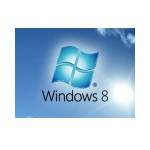With Microsoft gearing up this year for Windows 8, I thought I would survey the stats on desktop OS share, and to no surprise, XP is still the leader. According to Forrester in March 2011, 60% of the corporate desktops were running XP. The mix is somewhat less on the consumer side: According to NetMarketShare.com, XP has a 46% share as of December 2011. A compilation of other stats on Wikipedia shows between 26-45%, depending on who is counting. Certainly, there is still a lot of XP out in the world, and probably in your home and at your workplace.

So is 2012 going to be the year that we finally tip the balance and have something more recent that a 12 year old OS running on our Windows PCs? Probably not. Even though it has been years since you could actually purchase a copy of XP in any retail store, or buy it pre-installed on a new computer, XP continues to thrive.
Here is the trend from NetMarketShare over 2011:
There are several reasons why corporations are sticking with XP so long:
- They didn’t have much choice. Vista was such a disaster that most people skipped the upgrade. And while Windows 7 is making inroads, there are many PCs that can’t run it adequately. Until these are retired, most of us will stick with XP.
- IE isn’t as important as it once was. Microsoft tried to tie browser and OS upgrades together; this had forced many corporations who were looking to just upgrade IE v6 to switch to Chrome or Firefox browsers. By moving away from IE entirely, it doesn’t matter what is the underlying Windows OS.
- More people are buying Macs. Who wants to mess with cleaning up your Windows PCs when you can just get a Mac and not worry about its internals? I find that my Windows PCs need to be completely reimaged every couple of years because they get clogged up with digital gunk. The numbers from NetMarketShare show Macs almost doubling in the past year. It still is less than 10% of the total desktops, but growing fast.
- Delayed fleet purchases continue. Corporations used to upgrade their PC fleets every three or four years. That stopped sometime in the mid-2000s, and the refresh cycle continues to lengthen, favoring keeping those aging XP desktops in place. But the good news is that desktop/laptop prices continue to stay low, so when Win8 is available perhaps there will be a flood of upgrades.
- Sure Win7 is more secure than XP, but so what? Yes, there are exploits a-plenty with XP, but sometimes corporate IT folks would rather deal with the devil that they know. When Win 7 came out, many of the endpoint security tools didn’t yet work with it. Hopefully, that debacle won’t be repeated with Win 8 and corporations can secure them from the get-go.
- 64-bit Windows didn’t make things any easier for IT departments. We are still reaping the confusion around the conversion to 64-bit desktops and support for accompanying apps. (Linux and Mac fans, quiet down, we know you have that 64-bit goodness for a while now.) Many IT departments were content to wait this one out, but now at least we see this tide changing.
While an integrated Metro interface isn’t going to motivate anyone to upgrade to Win 8, perhaps resolving some of the above issues might pave the way for many corporations to finally move off of XP in the next 12 months.

















